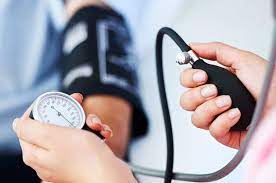What is Hypertension?
Hypertension, commonly known as high blood pressure, is a condition where the force of the blood against the walls of the arteries is consistently too high. This increased pressure can damage the arteries over time and lead to serious health problems, including heart disease, stroke, and kidney damage.
How Do I Know if I Have Hypertension?
Hypertension is often called the “silent killer” because it typically has no noticeable symptoms. The only way to know if you have high blood pressure is through regular monitoring. A healthcare professional can measure your blood pressure using a sphygmomanometer, which provides readings of systolic (pressure when the heart beats) and diastolic (pressure when the heart rests) pressure.
What is Considered High Blood Pressure?
Blood pressure is measured in millimeters of mercury (mm Hg) and recorded as two numbers:
- Systolic Pressure: The top number, representing the pressure when the heart beats.
- Diastolic Pressure: The bottom number, representing the pressure when the heart rests between beats.
Hypertension is diagnosed when:
- Systolic Pressure is consistently 140 mm Hg or higher.
- Diastolic Pressure is consistently 90 mm Hg or higher.
How Common is High Blood Pressure?
High blood pressure is a prevalent condition affecting millions of people worldwide. According to the American Heart Association, nearly half of adults in the U.S. have hypertension, making it a major public health concern.
Symptoms and Causes

Signs and Symptoms:
- Headaches: Persistent headaches, especially in the morning.
- Dizziness: Feeling lightheaded or faint.
- Blurred Vision: Sudden changes in vision.
- Shortness of Breath: Difficulty breathing or feeling out of breath.
- Nosebleeds: Frequent or unexplained nosebleeds.
Note that many people with hypertension may not experience any symptoms, which is why regular check-ups are crucial.
Is High Blood Pressure Genetic?
Genetics can play a role in the development of hypertension. A family history of high blood pressure can increase your risk of developing the condition. However, lifestyle factors and other health conditions also significantly contribute to its development.
What are the Risk Factors for High Blood Pressure?
Several factors can increase the risk of developing high blood pressure, including:
- Age: Risk increases with age.
- Genetics: Family history of hypertension.
- Obesity: Excess weight can raise blood pressure.
- Inactivity: Lack of physical exercise.
- Unhealthy Diet: Diets high in salt, fat, and processed foods.
- Smoking: Tobacco use can damage blood vessels.
- Alcohol: Excessive alcohol consumption.
- Chronic Stress: Long-term stress can contribute to increased blood pressure.
What are the Complications of Hypertension?
If left untreated, hypertension can lead to serious complications, including:
- Heart Disease: Increased risk of heart attacks and heart failure.
- Stroke: Elevated risk of stroke due to damaged blood vessels.
- Kidney Damage: Can lead to chronic kidney disease or kidney failure.
- Vision Problems: Damage to blood vessels in the eyes can cause vision impairment.
- Aneurysms: Weakening and bulging of blood vessels.
How to Manage Your Health—and Your Family’s—with Hypertension
Managing hypertension effectively involves a combination of lifestyle changes, medical treatment, and regular monitoring. Here’s how you can take control of your health and support your family in managing high blood pressure:
| Strategy | Description |
|---|---|
| Adopt a Healthy Diet | Emphasize a balanced diet with fruits, vegetables, whole grains, and lean proteins. Reduce salt intake and avoid processed foods. Encourage family adherence. |
| Engage in Regular Exercise | Aim for at least 150 minutes of moderate-intensity exercise each week. Activities like walking, cycling, or swimming benefit both you and your family. |
| Monitor Blood Pressure | Regularly check your blood pressure at home with a reliable monitor. Keep track of readings and share them with your healthcare provider. Encourage family monitoring. |
| Follow Medical Advice | Adhere to prescribed medications and treatment plans. Consult with your healthcare provider about managing hypertension and address concerns promptly. |
| Reduce Stress | Practice stress-reducing techniques such as meditation, deep breathing, and yoga. Stress management supports blood pressure control and overall well-being. |
| Limit Alcohol and Avoid Smoking | Reduce alcohol consumption and avoid smoking, as both can raise blood pressure. Promote a smoke-free and moderate-alcohol environment for the family. |
| Maintain a Healthy Weight | Achieve and maintain a healthy weight through a balanced diet and exercise. Weight management is crucial for controlling blood pressure. |
| Educate and Support | Educate your family about hypertension, its risks, and the importance of management. Provide support and encouragement for lifestyle changes and medical adherence. |
Why We Are the Best for Treating Hypertension (High Blood Pressure) in the Nagpur Region:
At Rhythm Heart and Critical Care, we excel in treating high blood pressure in Nagpur. Our team of experts uses precise diagnostic tools and develops personalized treatment plans based on your needs.. We offer comprehensive management programs, including lifestyle and dietary guidance, and provide advanced monitoring solutions to track your progress. With a commitment to personalized support and advanced treatment options, we ensure that your condition is managed effectively and with the utmost care. Choose Rhythm Heart and Critical Care for expert, comprehensive, and personalized hypertension care.


